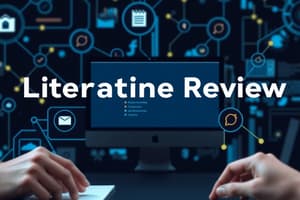Podcast
Questions and Answers
Quel outil AI facilite la gestion des citations dans les revues de littérature ?
Quel outil AI facilite la gestion des citations dans les revues de littérature ?
- ChatPDF
- Research Rabbit (correct)
- Google Bard
- Aucun de ces choix
Quel problème éthique potentiel lié à l'utilisation de l'IA dans la recherche académique est mentionné ?
Quel problème éthique potentiel lié à l'utilisation de l'IA dans la recherche académique est mentionné ?
- L'IA pourrait être biaisée et influencer les résultats de la recherche
- Les deux, a) et b) (correct)
- Aucun problème éthique n'est mentionné
- Les résumés générés par l'IA pourraient ne pas représenter avec précision les intentions de l'auteur original
Quelle affirmation décrit le mieux le rôle de l'IA dans les revues de littérature ?
Quelle affirmation décrit le mieux le rôle de l'IA dans les revues de littérature ?
- L'IA réduit la qualité des revues de littérature en raison de son manque de fiabilité.
- L'IA permet un traitement rapide des données et une analyse détaillée, fournissant des informations précieuses. (correct)
- L'IA remplace complètement le besoin de revues de littérature manuelles.
- L'IA n'a aucun rôle à jouer dans les revues de littérature.
Selon le texte, que doivent faire les chercheurs pour s'assurer d'une utilisation éthique de l'IA dans la recherche académique ?
Selon le texte, que doivent faire les chercheurs pour s'assurer d'une utilisation éthique de l'IA dans la recherche académique ?
Quelle affirmation résume le mieux les avantages de l'utilisation de l'IA dans la recherche académique ?
Quelle affirmation résume le mieux les avantages de l'utilisation de l'IA dans la recherche académique ?
Quelle affirmation est vraie concernant l'outil Elicit basé sur l'IA dans la recherche académique ?
Quelle affirmation est vraie concernant l'outil Elicit basé sur l'IA dans la recherche académique ?
Quelle préoccupation éthique pourrait être soulevée par l'utilisation de l'IA dans la recherche académique ?
Quelle préoccupation éthique pourrait être soulevée par l'utilisation de l'IA dans la recherche académique ?
Quel avantage principal l'outil Scite basé sur l'IA offre-t-il aux chercheurs ?
Quel avantage principal l'outil Scite basé sur l'IA offre-t-il aux chercheurs ?
Quelle tâche l'IA pourrait-elle automatiser de manière efficace dans le cadre d'une revue de littérature ?
Quelle tâche l'IA pourrait-elle automatiser de manière efficace dans le cadre d'une revue de littérature ?
Quel pourrait être un inconvénient potentiel de l'utilisation de l'IA dans la recherche académique ?
Quel pourrait être un inconvénient potentiel de l'utilisation de l'IA dans la recherche académique ?
Quelle tâche l'IA ne pourrait-elle probablement pas automatiser efficacement dans la recherche académique ?
Quelle tâche l'IA ne pourrait-elle probablement pas automatiser efficacement dans la recherche académique ?
Flashcards are hidden until you start studying
Study Notes
Artificial Intelligence (AI)-Driven Tools in Academic Research
Overview of AI in Academic Research
Artificial intelligence (AI) has become an integral part of our daily lives, and it is increasingly being used in academic research to streamline processes and enhance the quality of work. AI tools are designed to automate various tasks that are time-consuming or require a significant amount of effort. In this article, we will explore how AI can be utilized in academic research, focusing on three main subtopics: automation in research using AI, ethics associated with AI in academic research, and the role of AI in literature reviews.
Automation in Research Using AI
AI is revolutionizing research by enabling quicker and more efficient data collection and analysis. Some powerful AI tools include:
-
Elicit: This tool uses natural language processing (NLP) algorithms to extract key phrases, sentences, and paragraphs from research papers. It significantly reduces the time spent on manual literature searches and enhances precision, allowing researchers to focus on relevant sources.
-
Scite: Scite is an AI tool that evaluates the credibility of research papers by analyzing citation contexts. It provides users with accurate citation metrics, summary recommendations, and similarity checks, helping identify influential works in their field and track citations.
-
Research Rabbit: An AI-powered literature review tool, Research Rabbit automates the tedious task of citation management. It integrates with popular reference management software like Mendeley, Zotero, and EndNote, making importing and managing references easy.
-
Google Bard: Google's experimental AI service, Google Bard, delivers more relevant and contextually accurate results by analyzing the meaning behind search terms. By optimizing efficiency, it contributes to the effectiveness of literature reviews.
-
ChatPDF: ChatPDF utilizes AI for summarization and review, enabling you to upload PDFs and interact with them as if they were chatbots. This makes literature reviews more time-efficient and insightful.
These AI tools enable researchers to handle complex datasets and analyze large amounts of information efficiently, providing valuable insights and improving overall research outcomes.
Ethics of AI in Academic Research
Despite the benefits of AI in academia, there are concerns about ethical issues that arise when using these technologies. For instance, AI-generated content may not accurately represent the original author's intentions, leading to potential plagiarism and copyright infringement. Additionally, there may be biases inherent in AI algorithms, which could influence the outcome of research. To address these challenges, researchers must ensure transparency in their use of AI technologies and strive for ethical practices when utilizing these tools.
AI in Literature Reviews
AI can be a valuable asset when conducting literature reviews, as it allows for rapid data processing and detailed analysis. However, there are also concerns about the reliability of AI-generated summaries and the potential impact on the quality of the literature review. Researchers should remain vigilant to ensure that any insights drawn from AI tools are accurate and relevant to their research.
Conclusion
In conclusion, AI is transforming academic research by automating laborious tasks, providing more precise results, and enabling researchers to focus on the most important aspects of their work. While there are ethical considerations and limitations associated with AI use, these challenges can be addressed through responsible practices and ongoing advancements in AI technology. By embracing AI-driven tools, academia stands to benefit significantly from increased efficiency, improved collaboration, and enhanced understanding across various disciplines.
Studying That Suits You
Use AI to generate personalized quizzes and flashcards to suit your learning preferences.




